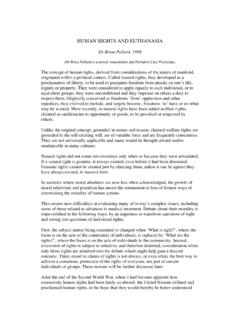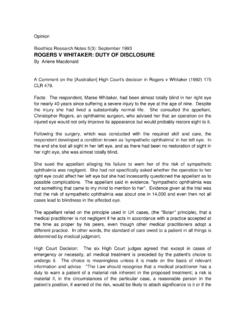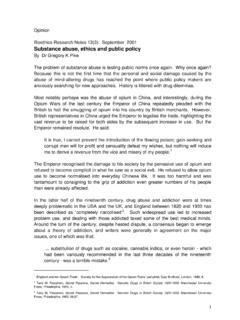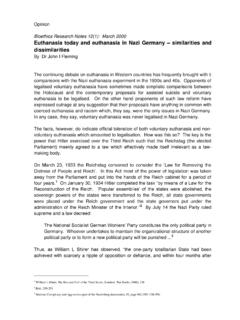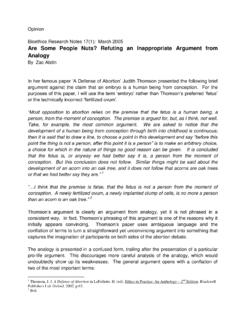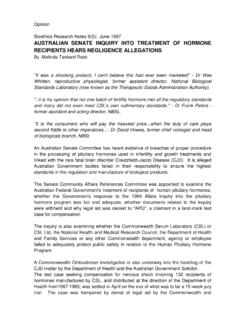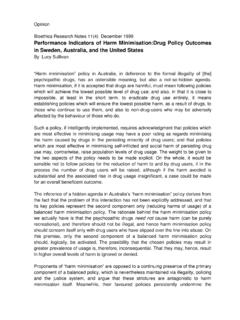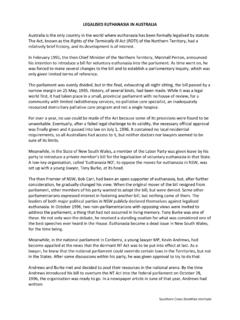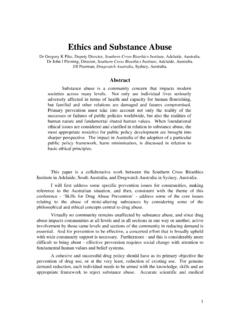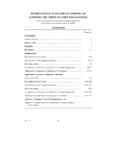Transcription of Opinion Understanding the Nature of Drug Addiction
1 Bioethics Research NotesVolume 22 Issue 1 March 2010 Opinion Understanding the Nature of Drug Addiction By Matthew TieuIntroductionThe attempt to understand the Nature of drug Addiction , why people become addicted and how to treat them raises many perplexing issues concerning the Nature of free will, autonomy, self control, rationality, responsibility, justice and blame. The way we regard and treat drug addicts depends on the crucial question of whether drugs addicts are to a lesser or greater extent, in control of their drug taking behaviour. As researchers shed further light on these matters, we will gain a better Understanding of the Nature of drug Addiction , which will mean that ethi-cally appropriate and effective treatment practices can be implemented. Whilst we have a reasonably good Understanding of the neurobiology of drug Addiction , there is still much debate on whether drug addicts are properly regarded as sufficiently auton-omous and thus in control of their Addiction such that they can be held accountable for their continued Addiction , or whether they have lost a sufficient degree of autonomy, such that they are unable to voluntarily refrain from further drug taking.
2 In light of our current Understanding of neuroscience as well as what we know about the behav-iour of addicts, it is incorrect to conclude that drug addicts are not responsible for their continued drug taking on the grounds that they have significantly diminished autonomous Neurobiology of the Addicted MindWe now have a general Understanding of the common neurobiological mechanism that underlies Addiction whether they are addic-tions associated with particular substances or behaviours. The neurobiological basis of Addiction is based on the activation of common neural systems associated with reward . The reward system is in place to subserve normal biological functions such as obtaining food and other resources for survival such as finding potential mates (for species survival). Activities such as eating and sex are pleasurable actions and are not intrinsically addictive, however, it is by virtue of the experience of reward that such activities can become addictive.
3 The distinguishing feature of addictive drugs is their ability to directly, and with greater intensity, activate the brain s reward system. Drugs known to be highly addictive such as cocaine, amphetamines and heroin directly activate the reward system, giving rise to feelings of pleasure as well as reinforcement of the behaviour that leads to that pleasure. Interestingly, behavioural addictions such as pathological gambling1,2 and sex addic-tion3 also involve activation of the reward system and related neurophysiological and biochemical pathways. This gives us a unified neurobiological theory of the addic-tive reward system is a highly complex system and is composed of sub compo-nents and several distinguishable neurobio-logical mechanisms4. Reward often mani-fests as hedonic pleasure and motivation to seek out that pleasure as well as to avoid displeasure.
4 Motivation is best understood in terms of affinitive versus aversive moti-1 Knutson, B., Adams, C., Fong, G. & Hommer, D. (2001) Anticipation of increasing monetary reward selectively recruits nucleus accumbens. Journal of Neuroscience, 21 Reuter, J., Raedler, T., Rose, M., hand, I., Glascher, J. & Buschel, C. (2005) Pathological gambling is linked to reduced activation of the mesolimbic reward system. Nature Neuroscience, 8, pp Goodman, A. (2008) Neurobiology of Addiction : An integrative review. Biochemical Pharmacology Vol 75, (1), Pp 266-3224 For example Berridge and Kringelbach (2008) refer to three sub components of reward. Firstly, there is the liking component which constitutes the pleasurable impact. Secondly, there is the wanting component which is the motivation for reward seeking behaviour and thirdly there is the learning component which involves associations, representations and predictions about future rewards based on past experiences.
5 The operation of these components involves both conscious and non-conscious processing. Berridge, and Kringelbach, M. L. (2008) Affective neuroscience of pleasure: reward in humans and animals. Psychopharmacology. 199: Cross Bioethics Institutevation, where the former involves behav-iour directed towards achieving pleasure and the latter involves behaviour directed away from unpleasantness. Addiction also involves the memory and reinforcement of pleasurable experiences as well as appraisal of them, combined with the aversion to the characteristic physiological withdrawal symptoms associated with particular drugs. The manner in which this process may facili-tate Addiction is that over time it may render an addict depressed after their high, and unable to be motivated by normal rewards, driving the intense cravings for future drug use. Conversely and somewhat paradoxi-cally, the reward system also becomes even more sensitive to the drugs themselves.
6 These mechanisms of tolerance and sensi-tivity mean that after a period of cessation, memories of past highs, cues, and small doses could elicit strong reward responses and thus facilitate Prefrontal Cortex (PFC) is respon-sible for carrying out executive functions, such as working memory, reinforcement learning, planning, adapting, inhibitory control and integration of information for goal directed guidance of behaviour. The PFC is integrated with the reward system and is involved in the encoding of reward based goals. Drug related cues and reward experiences after taking drugs can become integrated into the goal directed behaviour that the PFC is responsible for thus allowing a drug to become a valued goal above other learned goals6. Furthermore, a number of studies have also demonstrated that inhibi-tory control is also impaired by such drug 5 The molecular basis for this involved delta FosB, a transcription factor that may cause hypersensitivity to drugs.
7 This is reviewed in Esch, T and Stefano, G. B. (2004) The neurobiology of pleasure, reward processes, Addiction and their health implications. Neuroendocrinology Letters August : pg. Montague PR, Hyman SE, Cohen JD. 2004. Computational roles for dopamine in behavioural control. Nature 431:760 67induced maladaptive changes to the PFC7,8,9. Gradually there is shift from conscious motivated seeking of drugs to a stimulus-response driven drug habit. The drug taking habit essentially becomes more ingrained making it harder to break. Combined with the characteristic withdrawal symptoms associated with particular drugs, the user develops both a psychological and a physi-ological dependence on the drug and finds themselves in the grips of Addiction . Hence arises the popular notion that an addict s mind has been hijacked . They are perhaps no longer autonomous agents who are able to have authority over their actions.
8 Perhaps they have a disease that they cannot of their own volition overcome? Addiction as a Disease When it comes to deciding whether addicts are sufficiently autonomous to control their Addiction it is important to determine whether it is indeed the case that addicts do not have authority over their drug taking habit or to put it another way, whether they lack a basic capacity for self control. Is their free will significantly diminished due to their drug Addiction ? The answer to this question has significant implications for how an addict may respond to their situa-tion and how we may wish to treat them, given that a person s beliefs will influence their subsequent behaviour. For example, believing that one is capable of flying over the edge of a cliff is detrimental given that it is indeed the case that one cannot. Though consider a corollary of this - the belief that one is incapable of passing a school exam, even though one is clearly as competent as any other person.
9 An incorrect belief that one is helpless or that one lacks free 7 Volkow ND, Fowler JS. 2000. Addiction , a disease of compulsion and drive: involvement of the orbitofrontal cortex. Cereb. Cortex 10:318 258 Goldstein RZ, Volkow ND. 2002. Drug Addiction and its underlying neurobiological basis: neuroimaging evidence for the involvement of the frontal cortex. Am. J. Psychiatry 159:1642 529 Li, C. R. & Sinha, R. (2008) Inhibitory control and emotional stress regulation: Neuroimaging evidence for frontal-limbic dysfunction and psycho-stimulant Addiction . Neuroscience and Biobehavioral Reviews, Vol 32: Research NotesVolume 22 Issue 1 March 2010will can indeed be detrimental also. Hence the latter example is a detriment to oneself in a different sense than the former in that such beliefs and attitudes may give rise to what we might call learned helplessness 10. It is a false belief that one is incapable of performing a particular task.
10 Essentially it means that one mistakenly believes that one s situation cannot be resolved by use of one s free kind of deterministic view of Addiction seems to be the logical conclusion to draw from a disease model of Addiction . Empir-ical research by psychologist Roy Baumeister has also demonstrated that a belief that one s behaviour is determined, rather than being the product of free will, can give rise to a number of anti-social behaviours such as increased cheating behaviour11, increased aggression toward others and reduced helpfulness12. Those in this situation are less likely to think for themselves or feel guilty or responsible for their disease model can also in some sense be rather seductive given that it provides a causal explanation of Addiction at the level of biology or genetics, which may provide a convenient escape from personal level responsibility.
